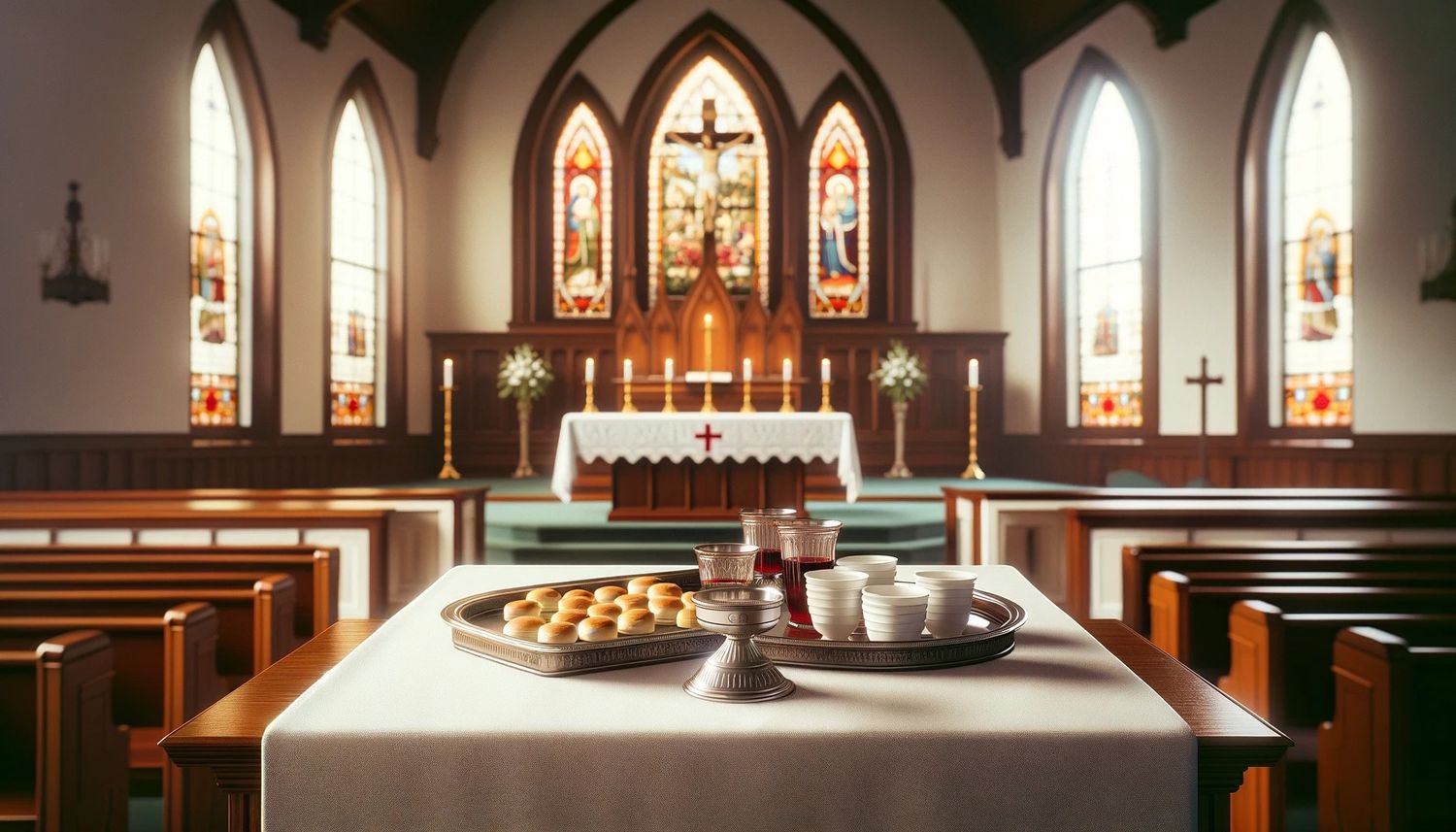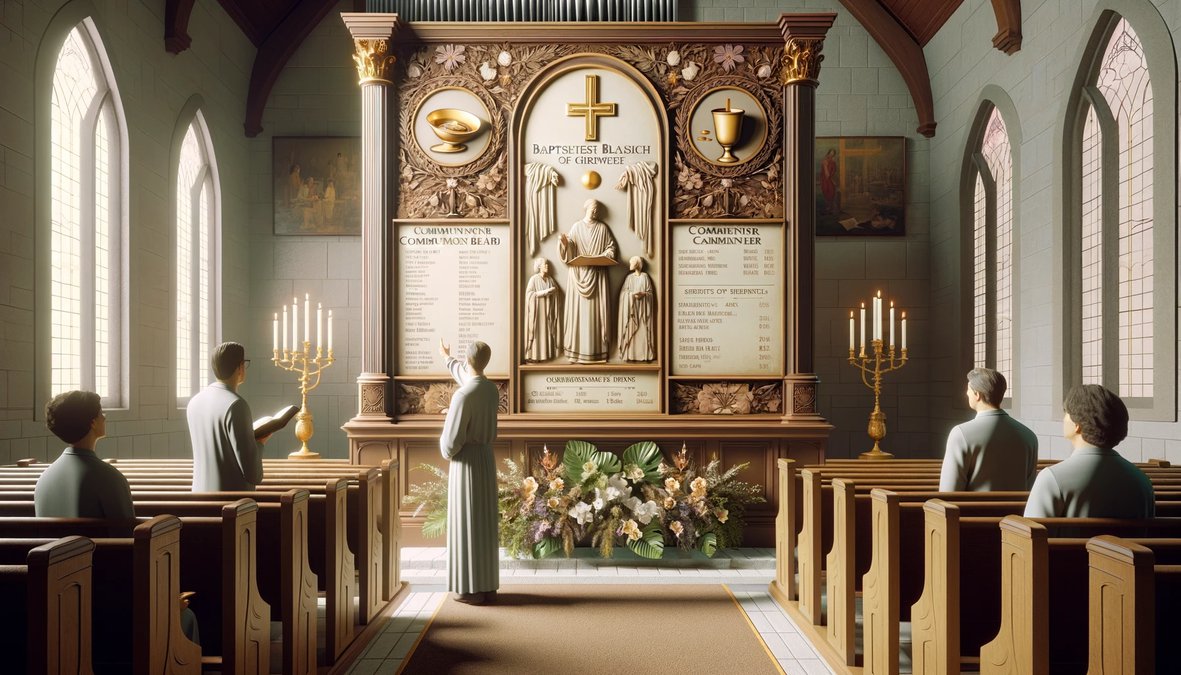Home>Theology and Spirituality>How Often Do Baptist Churches Have Communion


Theology and Spirituality
How Often Do Baptist Churches Have Communion
Published: February 20, 2024
Ericka Andersen, an editor at Christian.net, expertly merges digital strategy with content creation, focusing on faith and societal issues. Her communication skills enhance the platform's engaging narratives, fostering meaningful dialogue on belief's impact on society.
Discover the frequency of communion in Baptist churches and its significance in theology and spirituality. Learn about the traditions and practices surrounding this sacrament.
(Many of the links in this article redirect to a specific reviewed product. Your purchase of these products through affiliate links helps to generate commission for Christian.net, at no extra cost. Learn more)
Table of Contents
Introduction
Communion, also known as the Lord's Supper or the Eucharist, holds profound significance in the life of Baptist churches. This sacred practice, rooted in the Last Supper of Jesus Christ with his disciples, symbolizes the central aspects of the Christian faith: the sacrificial death and resurrection of Jesus. As such, it serves as a spiritual nourishment and a unifying force within the Baptist community.
The observance of communion is a deeply meaningful and solemn event, where members come together to partake in the bread and wine, representing the body and blood of Christ. This act of remembrance not only honors the sacrifice of Jesus but also fosters a sense of unity and fellowship among believers. It is a time of reflection, gratitude, and spiritual renewal, as participants reaffirm their faith and commitment to Christ and one another.
In the Baptist tradition, communion is not merely a ritual but a profound expression of faith and a tangible reminder of the redemptive work of Jesus. It is a sacred moment that transcends time and space, connecting believers to the foundational events of Christianity and reinforcing their identity as the body of Christ.
The frequency and manner in which communion is observed in Baptist churches can vary, influenced by theological perspectives, historical practices, and the unique traditions of each congregation. Understanding the significance of communion and the diverse approaches to its observance provides valuable insight into the rich tapestry of beliefs and practices within the Baptist faith.
In the subsequent sections, we will delve deeper into the importance of communion in Baptist churches, explore the factors that influence the frequency of communion, and examine the diverse practices associated with this sacred rite. Through this exploration, we aim to gain a comprehensive understanding of the role of communion in the spiritual life of Baptist congregations.
Read more: How Often Do Methodists Have Communion
The Importance of Communion in Baptist Churches
Communion holds a central place in the spiritual life of Baptist churches, embodying profound significance and serving as a cornerstone of their faith. This sacred practice, often referred to as the Lord's Supper or the Eucharist, is deeply rooted in the teachings of Jesus Christ and the early Christian community. It symbolizes the sacrificial death and resurrection of Jesus, embodying the core tenets of the Christian faith.
At the heart of communion lies the act of partaking in the bread and wine, which symbolize the body and blood of Christ. This symbolic consumption serves as a poignant reminder of Jesus' ultimate sacrifice for the redemption of humanity. It is a tangible expression of gratitude and remembrance, evoking a sense of reverence and spiritual connection among the participants.
In the Baptist tradition, communion is not merely a ritualistic observance but a profound act of worship and spiritual nourishment. It serves as a unifying force, bringing together believers from diverse backgrounds and uniting them in their shared faith. Through the act of partaking in communion, individuals reaffirm their commitment to Christ and to one another, fostering a deep sense of community and fellowship within the congregation.
Moreover, communion serves as a time of reflection and introspection, prompting believers to examine their lives in light of the teachings of Jesus. It offers a moment of spiritual renewal, allowing participants to seek forgiveness, reconciliation, and a renewed sense of purpose in their Christian journey. The act of partaking in communion is a transformative experience, inviting believers to recommit themselves to the principles of love, compassion, and service exemplified by Jesus.
Furthermore, communion transcends the boundaries of time and space, connecting present-day believers to the foundational events of Christianity. It serves as a living link to the Last Supper, where Jesus shared a meal with his disciples, imparting profound teachings and instituting the practice of communion. This continuity with the historical roots of the faith reinforces the identity of believers as part of the larger narrative of God's redemptive plan for humanity.
In essence, communion in Baptist churches is a sacred and transformative practice that embodies the core values of the Christian faith. It fosters unity, spiritual nourishment, and a deep sense of connection to the redemptive work of Jesus. Through the observance of communion, believers are reminded of their shared identity as the body of Christ and are invited to embody the teachings of Jesus in their daily lives.
Frequency of Communion in Baptist Churches
The frequency of communion observance in Baptist churches varies widely, reflecting the diverse theological perspectives and historical practices within the denomination. Unlike some denominations that observe communion weekly or even daily, Baptist churches typically do not adhere to a strict schedule for communion. Instead, the frequency of communion in Baptist churches is often determined by the individual congregation's traditions, beliefs, and pastoral leadership.
In many Baptist churches, communion is observed on a monthly basis, often scheduled on the first Sunday of the month. This practice allows for regular participation in communion while also providing ample time for meaningful reflection and spiritual preparation. By observing communion monthly, Baptist congregations create a rhythm that emphasizes the significance of this sacred practice without imposing a rigid or overly frequent schedule.
Some Baptist churches may choose to observe communion less frequently, such as quarterly or biannually. This approach allows for a more deliberate and intentional observance of communion, with emphasis placed on the preparation and significance of the event. By spacing out the observance of communion, these congregations seek to ensure that each communion service is marked by deep reverence, spiritual contemplation, and communal unity.
On the other hand, certain Baptist churches may opt for a more frequent observance of communion, holding services every two weeks or even weekly. This approach reflects a desire for more regular spiritual nourishment and a deeper engagement with the symbolism and significance of communion. It also aligns with the belief that frequent participation in communion fosters a continuous and tangible connection to the redemptive work of Jesus Christ.
The frequency of communion in Baptist churches is not solely determined by tradition or historical precedent; it is also influenced by the theological convictions and pastoral guidance within each congregation. Some Baptist pastors may advocate for a more frequent observance of communion to emphasize its centrality in the life of the church, while others may prioritize a less frequent schedule to underscore the solemnity and preparation associated with communion.
Ultimately, the frequency of communion in Baptist churches reflects a balance between regular participation and the profound significance of this sacred practice. Whether observed monthly, quarterly, biannually, or more frequently, communion serves as a pivotal moment of spiritual nourishment, communal unity, and remembrance of the redemptive work of Jesus Christ within the Baptist faith tradition.
Factors Affecting the Frequency of Communion
The frequency of communion observance in Baptist churches is influenced by a myriad of factors that shape the theological, practical, and communal aspects of this sacred practice. Understanding these factors provides valuable insight into the diverse approaches to communion within the Baptist tradition.
-
Theological Emphasis: The theological perspectives held by a particular Baptist congregation play a significant role in determining the frequency of communion. Churches that place a strong emphasis on the sacramental nature of communion and its role in spiritual nourishment may opt for a more frequent observance, seeking to provide regular opportunities for believers to partake in the symbolic consumption of the bread and wine. Conversely, congregations that prioritize the symbolic and commemorative aspects of communion may choose a less frequent schedule, focusing on the profound significance and preparation associated with each observance.
-
Pastoral Guidance: The leadership and pastoral guidance within a Baptist church can greatly influence the frequency of communion. The personal convictions and theological leanings of the pastor or minister may shape the approach to communion observance, with some advocating for a more regular schedule to underscore its centrality in the life of the church, while others may prioritize a less frequent schedule to emphasize the solemnity and spiritual preparation associated with communion.
-
Historical Practices: The historical practices and traditions of a Baptist congregation can also impact the frequency of communion. Churches with a longstanding tradition of observing communion on a monthly basis may continue this practice as a way of honoring their historical roots and maintaining a sense of continuity with the past. Conversely, congregations that have adopted a more flexible approach to communion frequency may draw from a different historical context, reflecting a diversity of practices within the Baptist tradition.
-
Communal Dynamics: The communal dynamics and needs of the congregation are essential considerations in determining the frequency of communion. Churches with a strong emphasis on communal unity and spiritual nourishment may opt for a more frequent observance to provide regular opportunities for believers to come together in fellowship and remembrance. Conversely, congregations that prioritize intentional preparation and reflection may choose a less frequent schedule, allowing for deeper spiritual contemplation and communal unity during each observance.
-
Theological Education and Understanding: The level of theological education and understanding within a Baptist congregation can impact the frequency of communion. Churches that prioritize ongoing theological education and reflection on the significance of communion may be more inclined to observe it more frequently, seeking to deepen the congregation's understanding of its spiritual significance. Conversely, congregations that emphasize a more contemplative and intentional approach to communion may opt for a less frequent schedule, allowing for in-depth theological reflection and preparation.
In essence, the frequency of communion in Baptist churches is shaped by a complex interplay of theological, pastoral, historical, communal, and educational factors. By considering these influences, Baptist congregations seek to cultivate a meaningful and spiritually enriching experience for their members, reflecting the diverse expressions of faith within the denomination.
Different Practices of Communion in Baptist Churches
The observance of communion in Baptist churches encompasses a diverse array of practices, reflecting the rich tapestry of theological perspectives, historical traditions, and communal dynamics within the denomination. While the core elements of communion—partaking in the bread and wine as symbols of Christ's body and blood—remain consistent, the manner in which this sacred rite is conducted can vary significantly among Baptist congregations.
Read more: How Often Do Catholics Have Communion
Open Communion vs. Close Communion
One notable distinction in the practices of communion within Baptist churches is the approach to participation. Some congregations adhere to an open communion policy, welcoming all baptized believers, regardless of denominational affiliation, to partake in the Lord's Supper. This inclusive approach emphasizes the universal nature of Christ's redemptive work and invites believers from diverse backgrounds to share in the communal experience of communion. In contrast, other Baptist churches practice close communion, restricting participation to baptized members of their own congregation or those who share similar doctrinal beliefs. This more exclusive approach underscores the importance of doctrinal unity and spiritual accountability within the communion observance.
Communion Elements and Symbolism
The elements used in communion, such as the type of bread and wine or grape juice, can also vary among Baptist churches. While some congregations may use unleavened bread and wine, adhering closely to traditional practices, others may opt for leavened bread or grape juice, reflecting a more flexible interpretation of the symbolic elements. The symbolism associated with the communion elements may also be emphasized differently, with some churches placing greater emphasis on the literal representation of Christ's body and blood, while others focus on the symbolic significance of the elements as reminders of Christ's sacrifice and the spiritual nourishment offered to believers.
Communion Liturgy and Rituals
The liturgical aspects of communion, including the order of service, prayers, and readings, exhibit considerable variation across Baptist churches. Some congregations follow a structured liturgy, incorporating specific prayers and readings that have been passed down through tradition. Others may adopt a more spontaneous and extemporaneous approach, allowing for greater flexibility and personal expression in the communion service. The use of music, hymns, and congregational participation also contributes to the diverse ritual practices associated with communion in Baptist churches, reflecting the unique worship styles and cultural influences within each congregation.
Communion Preparation and Reflection
The manner in which communion is prepared for and reflected upon varies widely among Baptist churches. Some congregations place a strong emphasis on pre-communion preparation, encouraging members to engage in introspection, confession, and spiritual examination prior to partaking in the Lord's Supper. This intentional preparation underscores the solemnity and significance of communion, fostering a deeper sense of spiritual renewal and reconciliation among participants. Conversely, other churches may focus on the communal aspect of communion, emphasizing the shared experience of fellowship and unity as believers come together to partake in the sacred rite.
Communion Frequency and Scheduling
As discussed earlier, the frequency of communion observance varies among Baptist churches, with some congregations holding monthly, quarterly, biannual, or even weekly communion services. This diversity in scheduling reflects the unique theological, historical, and pastoral considerations within each congregation, shaping the rhythm and significance of communion within the worship life of the church.
In essence, the different practices of communion in Baptist churches exemplify the dynamic and multifaceted nature of this sacred rite within the denomination. These varied approaches to communion underscore the breadth of theological interpretations, historical traditions, and communal expressions that contribute to the rich tapestry of Baptist worship and spiritual life.
Conclusion
In conclusion, the observance of communion in Baptist churches is a deeply significant and multifaceted practice that embodies the core values of the Christian faith. The importance of communion as a symbol of Christ's sacrifice and a unifying force within the community cannot be overstated. The diverse approaches to the frequency and practices of communion within Baptist churches reflect the rich tapestry of theological perspectives, historical traditions, and communal dynamics that characterize the denomination.
The frequency of communion observance, influenced by theological, pastoral, historical, communal, and educational factors, underscores the delicate balance between regular participation and the profound significance of this sacred practice. Whether observed monthly, quarterly, biannually, or more frequently, communion serves as a pivotal moment of spiritual nourishment, communal unity, and remembrance of the redemptive work of Jesus Christ within the Baptist faith tradition.
Furthermore, the different practices of communion, including open versus close communion, variations in elements and symbolism, diverse liturgical rituals, and approaches to preparation and reflection, exemplify the dynamic and multifaceted nature of this sacred rite within the denomination. These varied approaches to communion underscore the breadth of theological interpretations, historical traditions, and communal expressions that contribute to the rich tapestry of Baptist worship and spiritual life.
Ultimately, the observance of communion in Baptist churches serves as a powerful reminder of the foundational events of Christianity and the ongoing redemptive work of Jesus Christ. It fosters unity, spiritual nourishment, and a deep sense of connection to the core tenets of the Christian faith. Through the observance of communion, believers are invited to embody the teachings of Jesus in their daily lives, fostering a community of love, compassion, and service.
In essence, communion in Baptist churches is a sacred and transformative practice that transcends denominational boundaries, uniting believers in their shared faith and commitment to Christ. It stands as a testament to the enduring significance of the Last Supper and the profound impact of Christ's sacrifice on the spiritual life of the community. As Baptist congregations continue to uphold and adapt the observance of communion, they embody the timeless traditions and enduring relevance of this sacred rite within the context of contemporary worship and spiritual expression.













